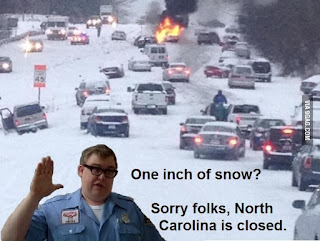With the chill of winter upon us now, I thought it might be good to focus several posts on winter survival and health during the winter months. Today I want to talk about taking care of your car and preparing for the worst, preparation beforehand is the best thing you can do to survive during these nasty cold months. If you are like me you travel back and forth to work and feel like you live in your car most weeks,our lives revolve around our vehicles. I sometimes feel like I take advantage of the fact my car starts and goes when I put the keys in the ignition. What a surprise and aggravation if you are not prepared for your car/truck/suv to not start or stop running when you least expect it. It is also a very helpless feeling to be stranded on the side of the road and think help is never coming. We often put off things we could do ahead of time until it is to late, taking care of your vehicle is something you must do today.
What can you do to be better prepared?
- Know some basics about your vehicle- how to change a tire, how to jump-start your battery, how to add fluids and where each fluid actually goes. (get someone to teach you these things, read and become familiar with your vehicles manual beforehand), little things go along way to solving a problem on the road.
- Check your tires- make sure you have good tires before winter gets here, check the tread and the amount of air pressure in the tires.
- Change or have your oil changed- cold temperatures can make your oil thicker and then it will not lubricate as well.
- Wax your car-- helps to protect it from corrosive salts on the road (you know that stuff they are spraying all over the roads to melt the ice/snow)
- Wiper blades- check them for wear and tear, change them if you are not sure. Heated wiper blades are an option now too. Windshield washer fluid for winter should have some de-icer/ antifreeze component to it, that will really help you on cold mornings (I use this all the time in the winter)
- Get a good tune-up and have the mechanic check all your belts and hoses, this will help prevent any mishaps due to a faulty belt or loose hose. A mechanic can check your vechicle for all of the above items and winterize it for you if you are not comfortable doing it yourself. A good mechanic will not mind showing you the ins and outs of your car either, they are good teachers of car care. (So I am a little biased, my little brother is a mechanic and is awesome..lol)
- Check your antifreeze (in the radiator that is..), this is a no-brainer.... the water in your radiator needs to have antifreeze added to keep your engine from freezing to death....literally. Make sure you get antifreeze that is rated for your area of the country. Here in the south (I live in NC) we don't use the same kind as say somebody in Buffalo NY due to the range in cold temps here in the south. Although it was a chilly 8 degrees the other morning and I about froze my tushy off.
- Fill your tank with gas-- you don't wanna get stuck on the side of the road and have to walk in the cold because you ran out of gas.
- Pack an emergency tote box in your vehicle-- this goes a long long way to saving your butt if you totally did not do any of the above tips and your car is dead on the side of the road or in a ditch somewhere..... I like to use a simple plastic tote box with handles that is clear so I can see what is inside. I keep my jumper cables, first aid kit and other emergency car care accessories in it all the time. During the winter I also keep these items in my .............
- Blankets or sleeping bags
- Paper towels
- De-icer spray
- Scraper and small shovel
- Energy boosting type Snacks (granola bars, dried fruits, canned fruits, beef jerky etc)
- Water- no sugary sweet soda, keeping hydrated will help save your life
- Another cell phone charger (maybe a juice box type charger too)
- Road flares and /or reflective triangles to signal you need help
- Extra gloves, hats, warm clothing
- Flashlights, camp light
- Pocket knife or multi-tool with knife,scissors and screwdrivers on it.
- Deck of cards or simple games for kids (coloring books/crayons work well too)
- List of emergency numbers or small phone book
- Toilet paper, wet wipes for personal hygiene (extra feminine hygiene items too)
- Basic meds like Tylenol (acetaminophen), Ibuprofen, Antacids, Anti-diarrhea , etc.(unless your first aid kit has these in it)
- Hand sanitizer
- Kitty litter- nonclumping kind- to help with tire traction and make walking easier around car
- Battery powered weather radio if possible (with extra batteries)
In the event of an emergency while driving in winter weather conditions the best advice I can give is STAY CALM! Getting anxious and all upset will help nobody in the event of any emergency. Stay in or near your car if possible and if it is safe. Make sure your phone is charged before the car battery dies, make sure your gps location service is on via your cell phone settings.









